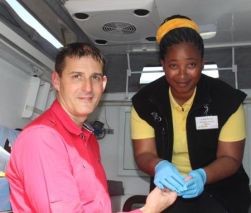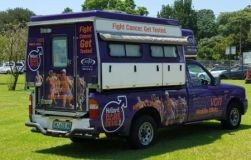The five leading types of cancer that indiscriminately afflict men in South Africa are:
Prostate, Colorectal, Lung, Non-Hodgkin’s Lymphoma and Bladder Cancer
1. Prostate Cancer:

The lifetime risk for Prostate Cancer in men in South Africa, is 1 in 16, according to the 2017 National Cancer Registry.
Prostate cancer, is the most common male cancer globally and locally and showing significant increases. International and local research indicates that the risk for aggressive prostate cancer is higher in black men.
The prostate is a walnut-sized gland of the male reproductive system, located just below the bladder. Prostate cancer often grows very slowly and may not cause significant harm, but some types are more aggressive and can spread quickly without treatment. In the early stages, men may have no symptoms. Later, symptoms can include frequent passing of urine, especially at night; difficulty starting or stopping urination; weak or interrupted urinary stream; painful or burning sensation during urination or ejaculation; blood in urine or semen. Advanced cancer can cause deep pain in the lower back, hips, or upper thighs.
Risk factors for prostate cancer include age, ethnicity, family history, being obese or overweight and some dietary factors appear to increase risk. Men can lower their risk of prostate cancer by eating a healthy diet (including lots of fruit and vegetables), maintaining a healthy weight and limiting red meat and high fat dairy products.
Prof Riana Bornman, Senior Research Professor at the University of Pretoria’s School of Health Systems and Public Health and Prof Vanessa Hayes, a Genomicist from the Garvan Medical Institute for Medical Research in Sydney, Australia, focused their research on prostate cancer men of black and Khoisan descent in Southern Africa to better understand the possible links between prostate cancer and African ancestry.
Bornman states, “The most common risk factors include African ancestry, increasing age (from 50’s onwards) and a family history of prostate cancer – on either the mother or father’s side. It might be that prostate cancer grows more rapidly in black than in white men and that transformation from latent to aggressive prostate cancer might occur earlier in black men. Rural men especially may present late and with advanced disease. Men who were biopsied for prostate cancer will be registered in the National Cancer Registry database in South Africa, however, there’s currently no registry for prostate cancer cases that were diagnosed without a biopsy. Therefore, the numbers reported for prostate cancer in South Africa are likely an underestimate of the real numbers occurring. Annual prostate specific antigen (PSA) testing is essential to help detect prostate cancer early, through a simple blood test and this is currently not routinely measured in men presenting at public hospitals.”
CANSA is investing in research in the high incidence of prostate cancer and is funding the Southern African Prostate Cancer study (SAPCS) conducted at the University of Pretoria. This study will contribute to understanding of prostate cancer risk, disease progression and outcomes specifically in the South African population. CANSA is also coordinating the IRONMAN (International Registry for Men with Advanced Prostate Cancer) study, funded by Movember Foundation and sponsored by the Prostate Cancer Clinical Trials Consortium. It will contribute to a large global study of 5000 men, evaluating the treatment and patient-reported outcomes for men with advanced prostate cancer.
Men need to go for simple screening tests to detect Prostate Cancer (see guidelines below). Screening results in early detection, enabling more effective treatment and a better chance of recovery:
- Routine Prostate Specific Antigen (PSA) testing, annually, from age 40 for all men at high risk of prostate cancer. This includes those men with more than one first-degree relative (father, brother or son) who had prostate cancer at an early age (younger than 65 years). Another risk factor to be aware of, is the potential increased risk for prostate cancer developing when there a family history of first-degree female relatives diagnosed with breast cancer linked to BRCA1 or BRCA2 gene mutation (first degree relatives include a mother, grandmother, sisters and aunts).
- Routine Prostate Specific Antigen (PSA) testing, annually, as from age 45 for all males who are at risk of prostate cancer. This includes men who have a history of prostate cancer on either the mother or father’s side, or with a first-degree relative (father, brother, or son) diagnosed with prostate cancer at an early age (younger than 65 years)
- Routine Prostate Specific Antigen (PSA) testing, at least once every two (2) years, for all males from age 50
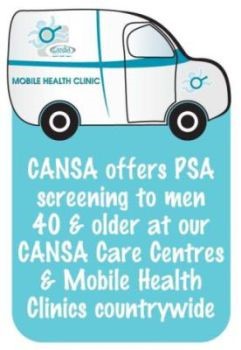
Reduce Risk Through Screening:
Although most enlargements of the prostate are not cancerous, regular screening is essential.
Prostate Specific Antigen (PSA) Test
Prostate Specific Antigen (PSA) is a protein produced by both cancerous (malignant) and non-cancerous (benign) prostate tissue. High PSA levels may indicate inflammation of the prostate or even cancer.
A blood test can establish if PSA levels are raised. PSA tests are available at most CANSA Care Centres across the country and via CANSA’s Mobile Health Clinics and Hollard MANVan. PSA testing is also available at public health care centres.

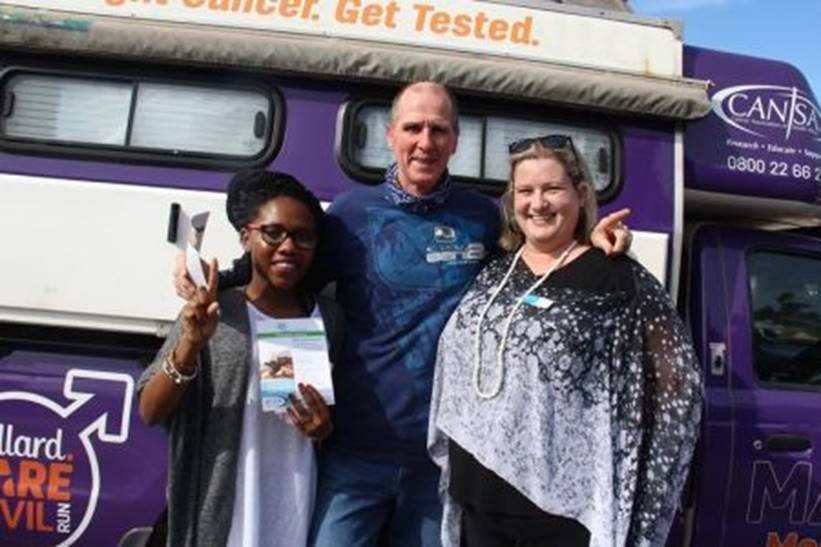
MANVan Statistics:
Total over the period 2015 – 2020: 20 015 tests done; 572 abnormalities detected, potentially helping to save 572 lives!
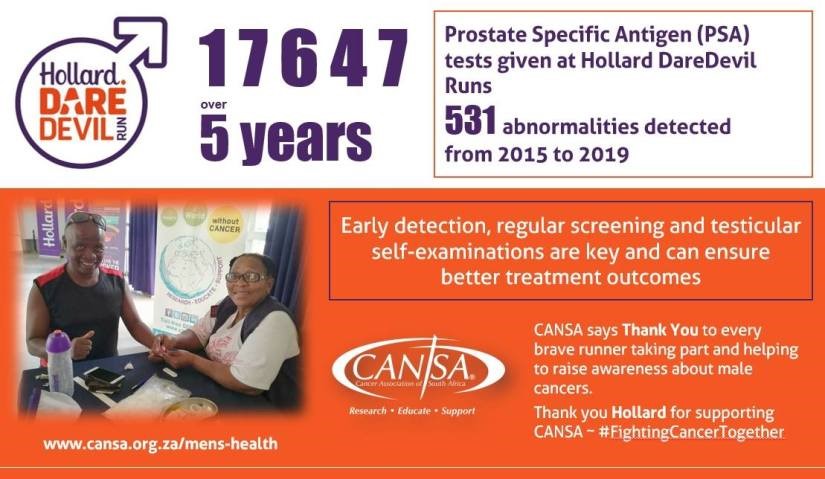
2020 – We’re thrilled to announce that our ‘Don’t fear the Finger’ video promoting awareness of Prostate Specific Antigen (PSA) tests and our Men’s Health programme, has won two awards presented by the Loeries! ‘Don’t Fear the Finger’ won Bronze in the Digital Social Media for HelloFCB+ and a Gold in the Film – TV & Cinema Commercials. We’re so grateful to HelloFCB+ the advertising agency that made the video for CANSA all at no cost. It’s great to have partners like them on board to help fight cancer.
Digitial Rectal Exam
Men aged 50 (40 – 45 for those at high risk, such as men with a family history of Prostate Cancer) should be examined annually.
A doctor examines the prostate through the rectum to check for any prostate lumps or abnormalities.
Learn more about Prostate Cancer, symptoms, screening and reducing risk:
- Fact Sheet: Prostate Cancer
- Leaflet: What is Your Risk for Prostate Cancer
- Role of PSA Screening on Prostate Cancer Diagnosis & Treatment
- Rectal Bleeding Following Radiation Therapy for Prostate Cancer
- Bookmark: CANSA Men’s Health Awareness
- Cancer Detectives Booklet 8: Southern African Prostate Cancer Study (SAPCS) Prof Riana Bornman
Athlone Grootboom, prostate cancer Survivor and member of CANSA Survivors – Champions of Hope Facebook Support Group: “Prostate cancer is not a walk in the park. I was diagnosed 3 and a half years ago. I went through several surgeries, tests, radiation and chemotherapy with its side effects. It’s a long road and a learning process. It’s better to get the recommended PSA tests!”
Dennis Feldman, prostate cancer Survivor, and member of CANSA Survivors – Champions of Hope Facebook Support Group: “My physician included a PSA test when I turned 50. At age 60 he called me to say I had elevated PSA levels and should see my urologist. After a biopsy six months later, I was diagnosed with early stages of prostate cancer. I HAD NO SYMPTOMS WHATSOEVER. If my physician had not annually included the PSA test, I would not have known I had cancer. I had surgery in 2012 and have had a PSA of 0.02 since then. I have had NO side effects. EARLY DETECTION IS A MUST. Many men are afraid to have a PSA test – please don’t; it can save your life.”
Gavin Tearne, prostate cancer Survivor and member of CANSA Survivors – Champions of Hope Facebook Support Group: “My PSA count doubled at age 54. Every male should go for yearly check up!”
* A paper published in 2014 examining the number of prostate cases diagnosed and deaths, showed significant increases than in previous years. (Babb C, Urban M, Kielkowski D, Kellett P. Prostate cancer in South Africa: pathology based national cancer registry data (1986–2006) and mortality rates (1997–2009). Prostate Cancer. 2014;2014.)
Diagnosis & Support
If you have been diagnosed with prostate cancer, please contact your local CANSA Care Centre so that our staff can offer you and your loved ones care & support, including medical equipment hire, wigs, counselling, support groups, online support groups and resources, as well as CANSA Care Homes where patients receiving treatment far from home can stay during treatment. Staff can also help guide you through the public health care system.
2. Colorectal Cancer

Colorectal cancer (cancer of the colon or rectum), is the second most common cancer and it is estimated that 1 in 74 SA men will develop colorectal cancer according to the NCR 2017. Read more about CANSA’s Colorectal Cancer Awareness and Support Campaign…
Should men experience abnormal symptoms, they should request a referral for a colonoscopy to screen for cancer. CANSA recommends a colonoscopy from the age of 50, every 10 years and earlier if there is a history of colorectal cancer.
In early stages symptoms are not present, however when they do occur, they may include:
- change in bowel habits (diarrhoea / constipation / consistency of stools)
- rectal bleeding or blood in stools
- persistent abdominal discomfort (cramps, gas or pain not related to diet)
- a feeling that the bowel does not completely empty
- weakness or fatigue
- unexplained weight loss
Treatment depends on how far the cancer has advanced and may include surgery, radiation, chemotherapy, or a combination of these therapies.
Risk factors: a family history of colorectal cancer; a personal history of inflammatory bowel disease; colorectal polyps, consumption of red & processed meats; low fruit & veg intake; low-fibre & high-fat diet; excess body weight; alcohol consumption; insufficient intake of clean, safe water; smoking, physical inactivity and exposure to chemicals. CANSA advises living a balanced lifestyle to reduce risk of colorectal cancer.
CANSA provides Faecal Occult at home stool tests (R100), which can be done at home. If the test is positive (visible red line on test strip) for the presence of blood in the stool, CANSA provides a referral letter to request a colonoscopy.
Diagnosis & Support
If you have been diagnosed with colorectal cancer, please contact your local CANSA Care Centre so that our staff can offer you and your loved ones care & support, including medical equipment hire, wigs, counselling, support groups, online support groups and resources, as well as CANSA Care Homes where patients receiving treatment far from home can stay during treatment.
A side effect of colorectal cancer may include having a colostomy. Many colorectal cancer patients have a portion of their bowel and / or colon removed and end up with a permanent stoma. A stoma is an opening on the abdomen that can be connected to the digestive or urinary system to allow waste to be diverted from the body. It can take a while for a patient to adapt to living with a stoma, so it’s important to seek support from CANSA.
CANSA offers professional pre- and post-operative counselling and support groups at our Stoma Clinics and Stoma bags and linen savers can be purchased at reduced prices at most local CANSA Care Centres. CANSA provides stock of the biggest stoma brands and guarantees the lowest prices, professional assistance and speedy delivery.
NB: Where a CANSA Care Centre is not equipped to provide the above-mentioned service, patients will be referred to reliable service providers in their local community.
The CANSA Tele Stoma Support Service offers online consultations for stoma patients and their families to assist with challenges or stoma queries. Make an appoinment on 0800 22 66 22.
Staff can also help guide you through the public health care system.


